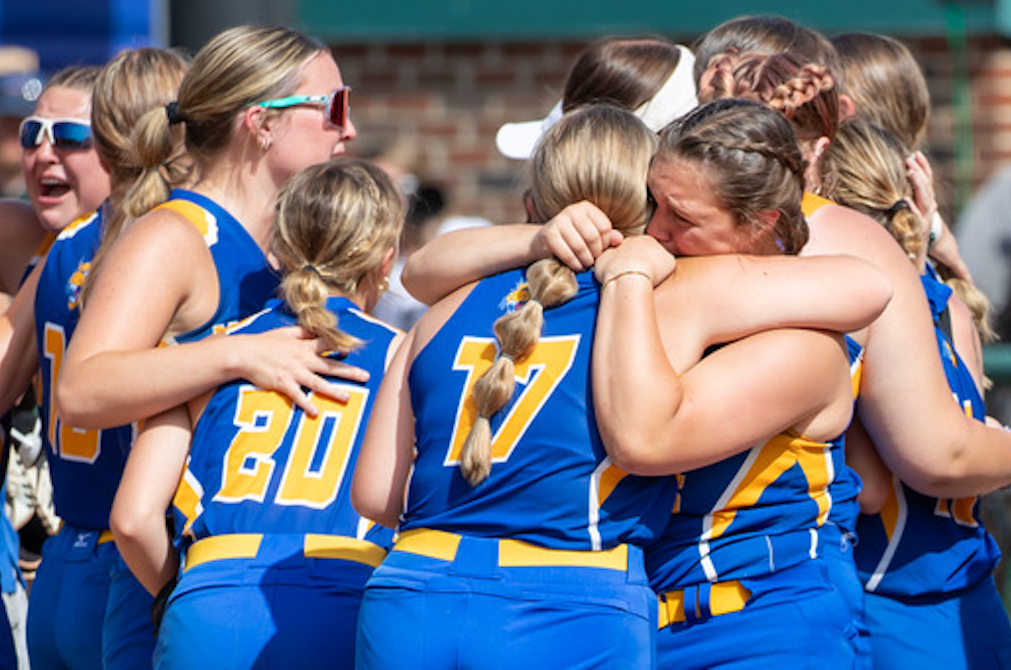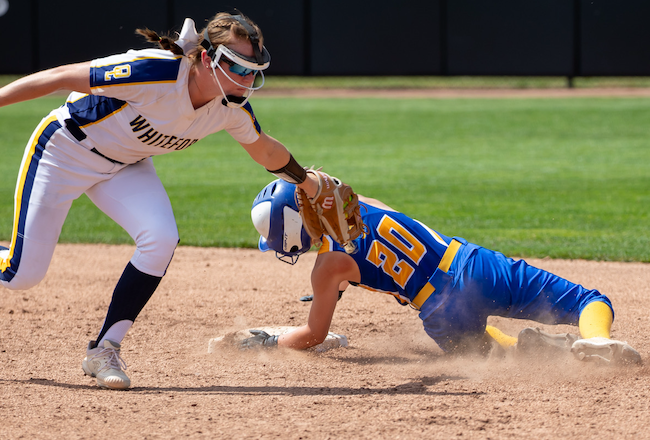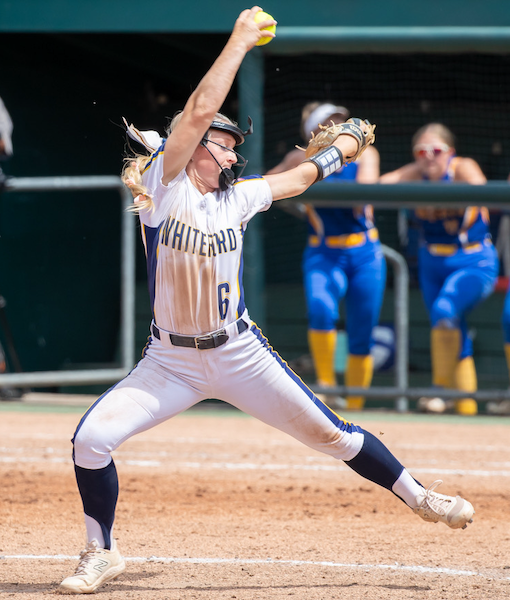
Powerful Voice for High School Sports
December 19, 2014
By Geoff Kimmerly
Second Half editor
Paul Carey was home from the U.S. Army only a few months and just shy of 25 years old when Beal City embarked on its first trip deep into the MHSAA boys basketball tournament.
On the call for local radio station WCEN from gyms at Saginaw Arthur Hill and Lansing Sexton, Carey served as the voice of the previously “laughable” Aggies as they reached the Class D Semifinals before falling just six points short of playing for the title.
“All of Beal City emptied out. They’d never had anything before,” Carey recalled during his annual Thanksgiving weekend visit to the MHSAA Football Finals at Ford Field. “When I got home, within the next two weeks I got a letter from every citizen of Beal City thanking me for broadcasting their games. That’s the kind of appreciation that meant so much.”
During 42 years on the airwaves, Carey was best known as a voice of the Detroit Tigers bounding out of transistor radios all over Michigan, thanks to WJR’s powerful signal.
But for the state’s high school sports community, his legacy is similarly memorable as the voice of the longtime football and basketball scoreboard show and a voter for various all-state teams and wire polls over the decades.
Now 86 and retired since 1991, Carey remains a regular during the first day of the Football Finals, taking in games he broadcast for the MHSAA during the late 1970s and that continue to hold his eye as they have for more than a half-century.
“It was a passion of mine. High school sports always has been,” Carey said. “I think because my dad was a high school coach, and teacher initially, and my brother was a high school coach and teacher, I just grew up in families that appreciated coaching and athletics. I was not a great athlete, but it kept my hand in following sports that way.”
Now, the scores
Carey partnered with Ernie Harwell for Tigers radio broadcasts from 1973-91, including during the march to the 1984 World Series championship. He was named Michigan Sportscaster of the Year six times and to the Michigan Sports Hall of Fame in 1992.
But Carey’s early career included sitting on top of a car, plugged into a phone pole, for a Sacred Heart football game at old Fancher Field just a few blocks from his family’s Mount Pleasant home. Among many more accolades are a Distinguished Service Award from the Michigan High School Coaches Association and a place in the Basketball Coaches Association of Michigan Hall of Fame.
In fact, the start of his weekly announcing of statewide football and basketball scores preceded his baseball career by 16 years and ended two months after he announced his final professional out.
The Michigan High School Scoreboard show was a staple of WJR’s late Friday nights from 1957-91. Carey would read every score he could collect from a variety of sources, often organized by league and with state rankings and context mixed in.
His idea came from something similar read by Len Colby for Kalamazoo’s WKZO. Carey’s brother Terry was coaching at Niles during the second half of the 1950s, and he and other coaches would get together to listen to the Friday night scores from the southwestern part of the state.
Carey, who left WKNX in Saginaw for WJR in 1956, explained to then-sports director Bob Reynolds that the station’s strong signal could provide for a truly statewide scoreboard experience.
Carey then connected with Edgar Hayes of the former Detroit Times, who gave the OK for Carey to call the paper on Friday nights to get scores from the Detroit metro area. For the rest, Carey relied on wire services – there were three at the time – who relied on newspapers from all over Michigan to call in scores over the course of an evening.
Before every Friday during high school football season – and later Tuesdays and Fridays during boys basketball season – Carey typed up lists of games based on schedules in the newspaper, with spaces to add scores. More than a few times, Carey raced down a back ramp at Tiger Stadium after a Friday night game, back to the WJR studio, with 15 minutes to prep for the show’s 11:30 p.m. start.
“If the Flint Journal, the Grand Rapids Press, the Traverse City paper didn’t call in scores to the AP, then I was out of luck too. And that happened all the time,” Carey said. “I would call back occasionally, say, ‘Did you get anything more?’ It was a rat race.”
The show originally was set for 10 minutes and then extended to 15. American Airlines sponsored a record show that followed, and Carey’s scoreboard show had a sponsor only once in 35 years. Finishing up on time was expected, even with more than 200 scores to read.
But Carey said he always went 20 minutes, sometimes 25.
“Because I wasn’t done. I just kept right on going,” Carey said. “Jay Roberts did the all-night show most of the time, and he was patient with me. He didn’t say too much on the air about ‘that guy ahead of me took all of my time.’”
Carey continued the “rat race” until his final scoreboard show, Dec. 20, 1991. He retired from WJR at the end of that calendar year. And it's important to note: Carey was never paid a dime extra for doing the program. .
“I think Paul is really just a sports fan, and that came across to the listener on his broadcasts,” MHSAA historian Ron Pesch said. “Paul would gather as much as possible off the wire. He'd interject if scores were missing from sections of the state. Press polls from the Free Press, News, AP and UPI were big, so he could point out close calls and upsets.
“He provided immediacy, or the closest thing to it in the days before cable TV and the Internet, and because of his scoreboard show, you could get the results before the morning paper. For listeners, he brought life to something as simple as game scores.”
First team all the way
Carey, who resides in Rochester, also served as the engineer on Tigers broadcasts for 16 years, through 1990. He broadcast Pistons games on the radio for six seasons and did the first broadcast of a Central Michigan University football game, in 1949.
Harry Atkins, covering Detroit’s teams while with The Associated Press for 29 years including the last 21 as its sports editor for Detroit, took note of his colleague's hard work – and especially that Carey was one of few broadcasters who was a journalist in addition to a voice.
That made Carey's other major role in high school sports a natural fit.
Atkins split The Associated Press all-state selection panels for football and basketball into 11 regions, and Carey represented the Detroit area for a number of years. He also was a longtime voter in those sports' weekly polls.
“Paul is just that kind of guy. He thought it was important and he made time in his busy schedule to do it,” Atkins said “And it had an impact on the other 10 voters on the All-State panels, too.
“Some of them were from small out-state newspapers or radio or TV stations. Yet every one of them knew who Paul Carey was. And when he spoke, of course, with what often is called "The Voice of God," those voters paid attention.”
And he still does, as well.
At the end of each fall, Carey still puts together a compilation of the three high school all-state football teams – Associated Press, Detroit Free Press and Detroit News – and files them with years of research and results.
“It’s important to me. Nobody sees it but me, but I get a certain kick,” Carey said. “Once in a while I’ll see a kid playing at Central, Western or (Michigan) State or Michigan, and they’ll say he came from Clawson. I’ll go into my all-state collections, say that would’ve been 2009 he played, and I find a name.”
In addition to the Football Finals on WJR, Carey was part of the Baseball Finals broadcasts into the early 1990s, continuing to contribute even after his retirement from his fulltime gig.
He spent high school games over the years sitting next to legends like the Free Press’ Hal Schram and remembers when current Free Press longtime scribe Mick McCabe was just a rookie. One of Carey's final broadcasts was a 1992 Baseball Final with his nephew Mike Carey, who continues to broadcast MHSAA championship games to this day.
“I am eternally grateful to Paul Carey. His contribution to high school sports in Michigan has been great and significant,” Atkins said.
“We are lucky to have him.”
PHOTO: Paul Carey (left) and nephew Mike Carey broadcast the MHSAA 1992 Class D Baseball Final between Hillman and Athens for PASS.

Just 1 Hit - Plus Brilliant Pitching - Earns Evart's 1st Finals Title in Any Sport
By
Tom Kendra
Special for MHSAA.com
June 15, 2024
EAST LANSING – Evart flexed its muscles during Friday’s Semifinals, smacking three over-the-fence home runs.
In Saturday’s Division 3 Final, the Wildcats managed only one single the entire game – which turned out to be just enough to bring home the first team state championship in school history in any sport.
Sophomore ace Kyrah Gray threw a shutout, and her sophomore classmate Mattisen Tiedt delivered her team’s only hit in the bottom of the sixth inning – a run-scoring shot to right field to bring home Allyson Theunick – lifting Evart to a 1-0 victory over hard-luck Ottawa Lake Whiteford at Secchia Stadium.
“You could tell it was going to come down to one hit, and I still can’t believe that it was me,” said Tiedt, a first baseman who bats fourth in the lineup.
The Bobcats never gave up, using singles from Kaydence Sheldon and Koralynn Billau to put runners on second and third base with just one out in the top of the seventh inning. But Gray showed her grit, digging deep and striking out the next two batters to preserve the win.
 Gray threw a five-hitter with 12 strikeouts in a classic pitchers’ duel against Whiteford senior Unity Nelson, who surrendered just the one hit and struck out eight.
Gray threw a five-hitter with 12 strikeouts in a classic pitchers’ duel against Whiteford senior Unity Nelson, who surrendered just the one hit and struck out eight.
“We won ugly,” said first-year Wildcats coach Shaun Gray, a 1998 Evart graduate and Kyrah’s father. “We have won ugly at times this year and, at other times, we showed off our bats. We’ll take it however we can get it.”
The win atoned for a heartbreaking Finals loss two years ago for Evart, which fell to Millington, 3-2, in eight innings.
This year’s game appeared headed for extra innings as both Gray and Nelson refused to give an inch.
Evart (37-4) finally got something going in the sixth inning when Theunick got hit by a pitch and stole second. That runner in scoring position brought the Evart fans, led by a loud and enthusiastic student section, to their feet.
After the next batter, slugger Katelyn Gostlin, fouled off several pitches before finally popping out to the shortstop, Coach Gray knew a breakthrough was near.
“Unity is such a great pitcher, but we were starting to get our timing down on her,” said Gray, who is assisted by Kevin Brigham. “I called a timeout and told Matty (Tiedt) that there was no one I would rather have batting right then than her. Then she got in there and came through.”
Whiteford (30-6-1) has lost in Finals three consecutive years, including now nearly identical 1-0 losses the past two.
In both of those games, Nelson dominated in the circle, only to see the opposition – Standish-Sterling last year and Evart this year – come through with one timely hit.
“Unity is one of the most inspirational players ever at Whiteford,” said fifth-year Bobcats coach Matt VanBrandt. “She keeps us in every game and, most of the time, we can do enough to win. Just not today.
 “But we played six games in Secchia Stadium in the last three years, which is pretty impressive.”
“But we played six games in Secchia Stadium in the last three years, which is pretty impressive.”
Sheldon and Billau both had two hits for Whiteford.
Nelson, who will continue her pitching career at North Dakota, finished her senior season with a 19-3 record and 287 strikeouts.
Part of the reason Whiteford was not able to break this time through was the clutch pitching of Gray with runners on base. The sophomore came of age on the state’s biggest softball stage, also striking out the final two batters during the second inning after Whiteford put two runners on, just like her finish to the seventh.
She smiled when told that gave her dad a special Father’s Day gift one day early.
“My whole focus this weekend was just to pitch my game and not get overwhelmed by all of this,” Gray said, pointing around MSU’s sprawling Old College Field, where baseball, softball and soccer championship games are played.
“We knew it would be a dogfight, and we had to keep fighting to get one. We finally got it.”
The win made a prophet out of Shaun Gray, who completed his first year as Evart’s varsity coach but knows all of the girls extremely well after coaching them for years in recreation and travel ball, starting in elementary school.
“I got laughed at when I said that Evart could compete for the state title and that Evart could have all-state players,” said Gray about his hometown of about 1,700 people, just moments after turning that championship vision into a reality.
“No one is laughing now.”
PHOTOS (Top) Evart players celebrate their first Finals championship in any sport Saturday at Secchia Stadium. (Middle) The Wildcats’ Keira Elder (20) slides under a Whiteford tag. (Below) The Bobcats’ Unity Nelson unwinds as she steps toward the plate.

